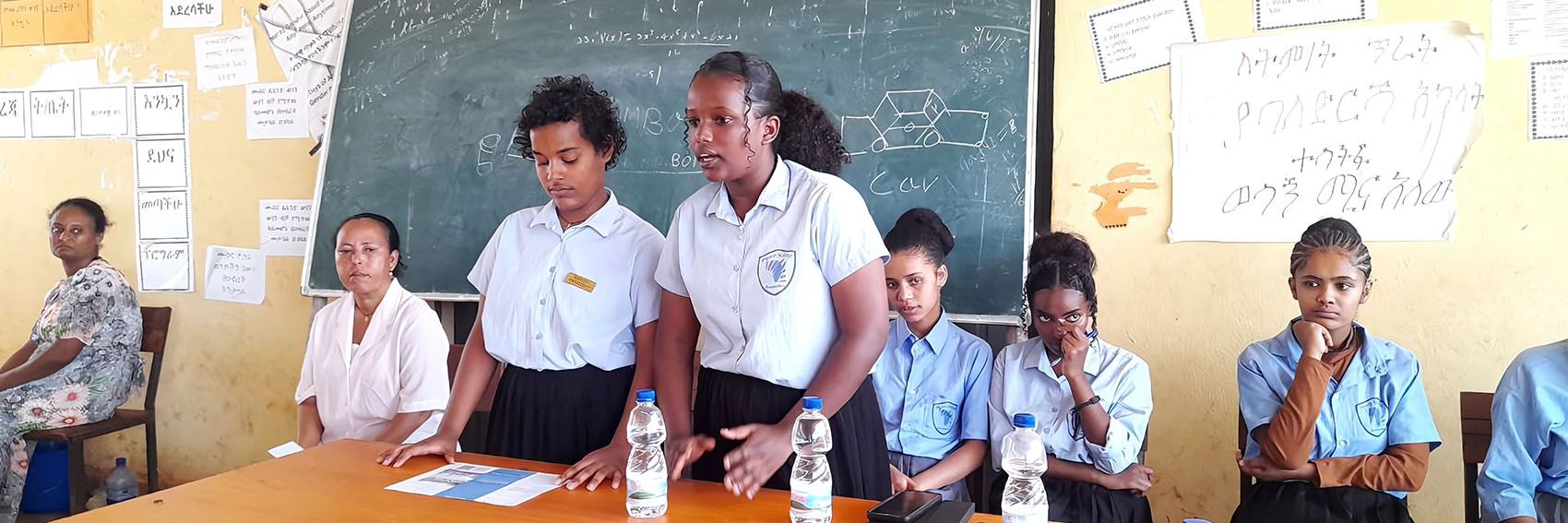
Inspired magazine
Featuring incredible insights and experiences of inspirational people from around the world, we explore some of the ultra-high net worth interests and passions that are thrilling and fascinating in equal measure.

21 August 2024
Please note: Barclays Private Bank does not endorse any of the companies or individuals referenced in this article.
Pharo Foundation wants to help change lives in Africa. As Global Director of Communications and Partnerships, Francesca Beausang is crucial to this mission. Isabelle Hayhoe, our Senior Philanthropy Adviser, spoke with her about the importance of listening to communities on the ground and the value of reassessing philanthropic goals.
Isabelle Hayhoe (IH): It’s a pleasure to speak to you today. Can I start by asking you to tell us a little about the foundation’s mission?
Francesca Beausang (FB): Pharo Foundation has a vision for a vibrant, productive and self-reliant Africa. Set up in 2011, we run economic development projects in Somaliland, Ethiopia, Rwanda and Kenya, with a focus on three core missions: education, water and productivity.
First, we’re looking to empower the next generation through improved access to high-quality and affordable education. Second, we help to address Africa’s water scarcity problem by providing access to a safe and affordable source of water. Finally, we work towards the removal of structural, health and financial obstacles to productivity and employment.
IH: These are such wonderful goals. It may sound like an obvious question, but why are these missions so crucial for communities in Africa and perhaps equally importantly, how are they linked?
FB: Water scarcity is the mother of all problems in East African communities1. Without water, there is no life. Hence in many ways, this is the starting point of all our efforts.
Water is the pre-condition of agricultural development, which can help alleviate a community’s food problem2. In turn, children with full bellies can take advantage of the educational opportunities we provide them with – from kindergarten to secondary school3.
The foundation has built eight Pharo Schools across Somaliland, Ethiopia, Kenya and Rwanda, supporting more than 3,600 students.
We also run 15 early childhood education centres within public schools in Hargeisa and another three in Berbera, Somaliland.
IH: Education makes such a difference on so many levels. Do you encounter many obstacles?
FB: Absolutely. We prize education because it is one of the few things that can never be taken away from our communities. With a solid education, young people should be in a position to secure a livelihood through productive employment.
Sadly, there are many obstacles to this in the African context. Two amongst them are ill-health and the mismatch between the worlds of education and work. We often witness a lack of adequate preparation of graduates, which results in employers rarely finding exactly what they are looking for, and unemployment or underemployment being widespread.
IH: Actively listening to communities in Africa must be hugely important to the foundation’s work. How do you ensure your work reflects what these communities actually need?
FB: Our priority has always been to deliver for our communities, which would be impossible without them being part of the process from idea generation. This goal has been a constant for us and is the main reason we maintain regular consultations with local people.
The communities we work with also suggest new locations for our projects – for example, many of our water dams are built on land donated by community members. We are also deeply rooted in local governments and have a strong reputation amongst them.
IH: What have been your proudest achievements through your work with the foundation?
FB: Seeing our secondary school graduates end up at colleges such as Stanford or Williams brings home to me how much we are changing lives. Another proud achievement is our intervention during the 2022 drought when we held an emergency committee meeting and reached out to the government’s National Drought Committee (NDC) with a plan.
We ended up donating 1,000 water trucks to the NCD and helped the government by putting together a water truck field mission, to personally distribute water to those villages in desperate need and to people who had been displaced.
IH: You describe the foundation as having gone through different eras. Why do you think it is so important for philanthropists to constantly reassess their goals?
FB: After a few years and a degree of success, it is easy to do more of the same. At some point, you need to think about the terms of your intervention, both how you are affecting communities and how you are leveraging the money you are using. Community needs evolve and the most effective ways of delivering these needs also change.
Because of our philanthropic approach of building and running our own programmes, we live by a mantra of learning-by-operating and more often than not, reassessments follow.
IH: Being self-reliant is also hugely important to the foundation. Why does this matter in philanthropy?
FB: Self-reliance is central to what we are trying to do. As a self-funded foundation, we can implement our vision without the need to fit into an external funder’s objectives. But more importantly, self-reliance is what we want for Africa itself and Pharo Ventures was created in that spirit in 2019.
This is the for-profit arm of the foundation, which was set up with the objective of building commercially sustainable businesses that can create jobs and add value to the economy.
Ventures are the future of Pharo Foundation because they can help provide the building blocks of a self-reliant African private sector, which will survive the foundation. To some extent, we will know that our job is done when there is no more external intervention but just a home-grown process of development. Ultimately, that is a philanthropist’s dream.
IH: And how do you see the foundation’s work progressing?
FB: We are embarking on more advocacy and policy-driven work in order to scale up our successful approaches at a national level. We are now starting to frame the issues and create coalitions for change on that national level.
The next five years will be about creating the partnerships that will allow us to scale up our impact from project to national level, moving us closer to our mission goals. In 10 years and beyond, I’d like to see the foundation starting to become a key player in global policy-making, where we will be setting the terms of what constitutes valuable goals for other organisations across our missions.
IH: Finally, may I ask what gives you the most joy in your role?
FB: The greatest satisfaction comes from collaboration with our local teams and communities. It is the meeting of worldviews that is interesting because that is the nature of development work.
For me, empowerment is the greatest measure of our success and I love to witness the results of this. For example, when I see projects such as Pharo Ventures’ upcoming sesame oil factory, which has been a labour of love, it makes me feel like we are on the right path towards African self-reliance.
Education, water scarcity and productivity: In numbers
Sub-Saharan Africa accounts for close to 30% of all out-of-school children globally4.
In 2021, 9 out of 10 children in sub-Saharan Africa could not read or understand a simple text by the age of 105.
Africa needs at least 9 million new classrooms and 9.5 million additional teachers by 20506.
1.34 billion Africans face water scarcity, which accounts for more than 90% of the continent’s population7.
Roughly two-thirds of Africa is categorised as arid or semi-arid, despite the continent possessing close to 9% of global freshwater resources8.
Within a decade, 1 in 3 entrants to the global workforce will be from Africa. Over the next 30 years, the majority of the world’s new workers may well be on the continent9.
Image credit: Pharo Foundation

Featuring incredible insights and experiences of inspirational people from around the world, we explore some of the ultra-high net worth interests and passions that are thrilling and fascinating in equal measure.
This communication is general in nature and provided for information/educational purposes only. It does not take into account any specific investment objectives, the financial situation or particular needs of any particular person. It not intended for distribution, publication, or use in any jurisdiction where such distribution, publication, or use would be unlawful, nor is it aimed at any person or entity to whom it would be unlawful for them to access.
This communication has been prepared by Barclays Private Bank (Barclays) and references to Barclays includes any entity within the Barclays group of companies.
This communication:
(i) is not research nor a product of the Barclays Research department. Any views expressed in these materials may differ from those of the Barclays Research department. All opinions and estimates are given as of the date of the materials and are subject to change. Barclays is not obliged to inform recipients of these materials of any change to such opinions or estimates;
(ii) is not an offer, an invitation or a recommendation to enter into any product or service and does not constitute a solicitation to buy or sell securities, investment advice or a personal recommendation;
(iii) is confidential and no part may be reproduced, distributed or transmitted without the prior written permission of Barclays; and
(iv) has not been reviewed or approved by any regulatory authority.
Any past or simulated past performance including back-testing, modelling or scenario analysis, or future projections contained in this communication is no indication as to future performance. No representation is made as to the accuracy of the assumptions made in this communication, or completeness of, any modelling, scenario analysis or back-testing. The value of any investment may also fluctuate as a result of market changes.
Where information in this communication has been obtained from third party sources, we believe those sources to be reliable but we do not guarantee the information’s accuracy and you should note that it may be incomplete or condensed.
Neither Barclays nor any of its directors, officers, employees, representatives or agents, accepts any liability whatsoever for any direct, indirect or consequential losses (in contract, tort or otherwise) arising from the use of this communication or its contents or reliance on the information contained herein, except to the extent this would be prohibited by law or regulation.
United Nations, ‘Water crises threaten world peace’, March 2024Return to reference
Unesco, ‘UN World Water Report’, 2022Return to reference
Greenpeace: ‘Water woes: 13 undeniable facts about Africa’s water scarcity,’ 22 March 2024Return to reference
UNESCO, ‘250 million children out-of-school: What you need to know about UNESCO’s latest education data’, 19 September 2023 Return to reference
UNICEF, ‘UNICEF joins forces with African Union to prioritize education in 2024’, 26 February 2024 Return to reference
World Economic Forum, ‘Why the world should look to Africa for education innovation’, 25 January 2024 Return to reference
Greenpeace, ‘Water woes: 13 undeniable facts about Africa’s water scarcity’, 22 March 2024Return to reference
Greenpeace, ‘Water woes: 13 undeniable facts about Africa’s water scarcity’, 22 March 2024Return to reference
World Economic Forum, ‘Why the world should look to African for education innovation’, 25 January 2024Return to reference